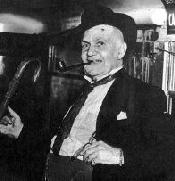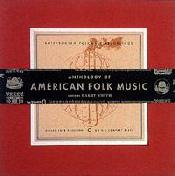ZOOLOGIC MISCEGENY ACHIEVED IN MOUSE FROG NUPTIALS
RELATIVES APPROVE
Jerry Springer, kiss my jalapeno cheese grits!
By Kevin Roe
 |
If you want the real scoop on America's basest behavior, turn off the idiot
box and fire up some scratchy old '78s -- like Chubby Parker's 1928 monster
hit, "King Kong Kitchie Kitchie Ki-Me-O," which relates the Weekly World
News-esque tale of a mixed-blood marriage between a flirtatious frog and a cantankerous country mouse. |
 |
 |
The arrival of this raspy old recording (and its 83 leering companions) as
part of Smithsonian/Folkways' long-awaited reissue of '50s hipster/folklorist
Harry Smith's infamous Anthology of American Folk Music was the highlight of
my otherwise musically indifferent summer.
|
 |
Whilst my alt-country brethren were singing the praises of yet another set of
well-meaning regional Uncle Tupelo knockoffs, and my NYC compadres were
braving the onslaught of Garth, I was driving around. And around. And
around. Skimming along the Kansas, Nebraska and South Dakota hills and
prairies , listening to not much more than the hum of my tires and the
incessant buzz of Great Plains grasshoppers, as my rock-weary eardrums got
their first rest in years.
Smith's Anthology was one of my first aural introductions to the weirdness,
danger and utter hilarity of vernacular American popular culture. When
compiled in 1952 by the eccentric record collector with a passion for early
country and blues, the Anthology of American Folk Music was greeted with one
big blank stare of apathy by the good old American public.
But for a few budding folkies and future rock critics, Smith's painstakingly
collated and wackily annotated collection of murder ballads, story songs and
goodtime dance tunes from the 78's pre-Depression heyday was the mother lode
of country and blues music. If nothing else, it introduced generations of
folklorists and beatniks to the likes of the Carter Family, Blind Lemon
Jefferson, Mississippi John Hurt and Uncle Dave Macon.
Hats off to Smithsonian/Folkways for this beautifully packaged enhanced CD
(Win95 and Mac) reissue, and for including a reproduction of Smith's
fanzine-like 1952 liner notes, which made rock scribe Greil Marcus froth at
the mouth like a rabid dog in sheer ecstasy in the bibliographic notes to his
own roots music epic, Mystery Train.
I'm also quite partial to another Smithsonian/Folkways collection, Close to
Home: Old-Time Music From Mike Seeger's Collection, 1952-1967. Like Harry
Smith, Mike Seeger appreciated old-time Southern music for what it was --
affordable, entertaining, time-passing stuff that had a good, danceable beat
-- and not for being a mystic link to the dark folklore of the ancient
British Isles.
Seeger's open-minded approach to field recording makes for a rolling set of
fiddle tunes, ballads and gospel numbers, featuring a cast of talented
no-names and some better-known folks like Ernest Stoneman, Tom Ashley, Snuffy
Jenkins, Dock Boggs and Sara & Maybelle Carter. The highlight of the
proceedings is a rollicking, spoken-word rant by a wild-ass soapbox preacher
type, Clyde Lewis, who manages to pun-tificate his way through a
side-splitting jumble of Biblical references, hoecake cornpone and downright
nonsense that would have left Lenny Bruce and Jerry Clower in the dust while
selling you a wheezing old jalopy in the process.
For a slightly more intellectual perspective on Southern music's past and
present, turn to the Oxford American Magazine's "Special Double Issue on
Music," and its companion 21-track CD.
For only $6.50, you get: a harrowing tale of a few days in the life of
hard-drinkin' bluegrass legend, Jimmy Martin; profiles of the late Ted
Hawkins, Rosetta Tharpe, Louis Prima and Skip James; conversations with
Lucinda Williams, Carl Perkins and Hi Records mastermind Willie Mitchell; and
an assumptions-challenging Nick Tosches portrait of '20s yodeling minstrel,
Emmett Miller.
The CD's a bit thin for my tastes, but gives a balanced portrait of the
artists profiled in the pages of the magazine. My hardened soul could have
done with a bit less Kate Campbell and helluva lot more Charlie Rich, but I'm
just a cranky old cynic, so take that into advisement and seek this out at
all costs.
While we're traveling the Dixie backroads, let's be neighborly-like and skip
right over the stuff we hated (like the new Ricky Skaggs CD!) and motor
through a few of the summer's roots-minded standouts.
Leading off is Whiskeytown's Rural Free Delivery (MoodFood), a raw, surging
blast from lead singer Ryan Adams and his North Carolina band's
not-so-distant past. The low-fi production values do these 1994 cuts a real
service, chunking up the rockers like "Take Your Guns to Town" with a
stuttering nervous energy, and adding a biting edge to Adams' sweetly rasped
vocals on "Angels Are Messengers From God" and "Pawn Shop Ain't No Place for
a Wedding Ring."
While the alt-country underground waits to mete out the verdict on
Whiskeytown's ability to make the major-label transition with new release,
Strangers' Almanac, the new one by The Old 97's Too Far to Care (Elektra)
,proves that mass distribution, big-name labels and people who live in Dallas
can be good things, after all.
This one picks up right where the careening, brilliant Wreck Your Life
(Bloodshot) left off, with producer Wally Gagel adding some hard-rock crunch
to Ken Bethea's stuttering rockabilly guitar work and fleshing out vocalist
Rhett Miller's wistful, winkingly self-deprecatory wordplay. It's everything
the Cure always wanted to be without all that messy makeup and awkward
androgyny (which might not go over too well down in the Big D, anyway).
California country singer Buddy Miller is not one for fancy appearances,
either, preferring to slouch down on-stage and hide behind his lowslung
baseball hat and twitching low-string guitar runs. But if he keeps on
kicking his guest performers' butts on albums like Poison Love (HighTone),
Miller might have to develop a little stage persona of his own to cope with
the sudden realization that this guy churns out raw, haunting country rock
that sticks with you long after the memory of his star-studded co-writers and
guest vocalists fade away.
Miller rises above the potentially deadening influence of the wincingly
amelodic Jim Lauderdale and reedy-voiced Emmylou Harris, latching onto his
own weathered, throaty voice and wife Julie's twangy harmonies to carry him
through a dizzying set of covers and originals. Lauderdale should stick to
writing and let Buddy take over. It's Miller time, and we want the Champagne
of Beers back. Forget about that cold-filtered, Genuine Draft crap!
With that kinda Archie Bunker attitude, I'm a sucker for throwbacks like
Straight Outta Boone County (Bloodshot), a 20-track tribute to Cincinnati
radio station WLW's '40s/'50s country showcases, "The Boone County Jamboree"
and "Midwestern Hayride." Bloodshot does what it does best here, getting
together a weird, talented sampling of today's weirdest, most talented
roots-rock acts and cutting them loose in a no-holds-barred concept setting.
The result is mighty fine, indeed. The Volebeats show a rare rocking side on
their hiccuping "Hamtrack Mama," while Kansas City's soon-to-be-revered
Holler sends Merle Travis's "No Vacancy" soaring to dynamic new heights.
Some of the acts try a bit too hard to top the old masters (as in The
Riptones' close-but-no-ceegar send-up of Homer & Jethro's "Hucklebuck" and
Hazeldine's somnolent Delmoresiana on "I'm Lonesome Without You"), but it's
all loose-limbed and none too self-important.
The same could and should be said of the immensely talented jazz fiddler,
Claude Williams, known around his hometown jazz hotbed as the King of Kansas
City for his deft, improvisational way around a violin. King of Kansas City
(Progressive) captures the 89-year-old Williams swinging, cutting and
bluesing around with a group of younger Kansas City jazz players and
vocalists. Together, they breathe new life into old standards like "St.
Louis Blues," "Nice Work If You Can Get It" and "Them There Eyes," while
letting Claude saw and strut his still-potent stuff on "Lester Leaps In," a
lick-trading tribute to Williams' primary influence, saxophonist Lester
Young.
It's enough -- along with the chance to see the aforementioned Holler live
once a month at a charming old dive (Davey's Uptown Ramblers' Club) -- to
make a guy pretty darned happy to be living in these transitional parts,
where East, Midwest, West and Southwest all seem to meet and mingle like the
jazz, blues and country still spilling out of old AM radios, 78-rpm thrift
store bins and windowless taverns on the fringes of town.
Which might explain my geeky giddiness over my latest historical find, Songs
of the Santa Fe Trail and the Far West (Gardner), by -- yep, that's right --
Mark Gardner and the Skirtlifters.
Blame it on one too many viewings of "Waiting for Guffman" or that
never-finished Ph.D. in history. I just can't seem to get enough Santa Fe
Trail ruts, tallgrass prairie preserves, Sonic Drive-In cherry lime-ades and
pre-Civil War banjo tunes (just ask my oh-so-patient Great Plains gal and
roadtrip pal, Deborah). All of these egregious eccentrics come together in
perfect harmony on this historically minded, often beautiful collection of
old Western trail songs and Mexican waltzes, done up all rubbery and
limber-like by Mark and the Skirtlifters and their tack-head banjo, parlor
guitar, fiddle and bones.
Pick one up at your friendly local National Trails Center or pull out the
washboard bass and toilet paper roll kazoo and light out for the Plains and
make your own. Ruts, that is. Deep, sticky, muddy ones. The good kind.
- Kevin Roe ([email protected])
Most of the releases reviewed in Rootin' Around can be found at Brooklyn's
Holy Cow; Manhattan's Venus, Smash and Norman's Sound & Vision; or via
mail-order from Roundup Records (800/443-4727), Atomic Beat (310/556-1144) or
Internet music stores Roots 'n' Rhythm Mail Order (510/525-1494,
[email protected], http://www.bluesworld.com/roots.html), Norton Records
([email protected], http://members.aol.com/nortonrec/norton.html), Miles of
Music ([email protected]). The Smith Anthology is available from Mabel's Music, www.mabels.com
Addresses of harder-to-find artists, magazines and labels are as follows: - Smithsonian Folkways, 955 L'Enfant Plaza, Suite 2600, MRC 914, Washington,
D.C. 20560, http://www.si.edu/folkways;
- Oxford American, P.O. Box 1156,
Oxford, MS 38655, [email protected];
- MoodFood, 1381 Kildaire Farms Rd.,
Ste. 246, Cary, NC 27511, http://www.moodfood.com;
- Old 97s, 5242 Richard
Ave., Dallas, TX 75206, http://www.old97s.com;
- HighTone, 220 4th St.,
Oakland, CA 94607, http://www.hightone.com;
- Bloodshot, 912 W. Addison,
Chicago, IL 60613, [email protected];
- Progressive, 1206 Decatur, New Orleans,
LA 70116; Mark Gardner & the Skirtlifters, P.O. Box 879, Cascade, CO 80809.
This article was originally published in SoundViews Magazine, New York
Copyright 1997, SoundViews Magazine, New York, NY andKevin Roe
Reissued with the permission of the author
See also: North America, Lomax Collection, Allen Ginsberg




